Unit1学案
- 格式:doc
- 大小:120.00 KB
- 文档页数:23
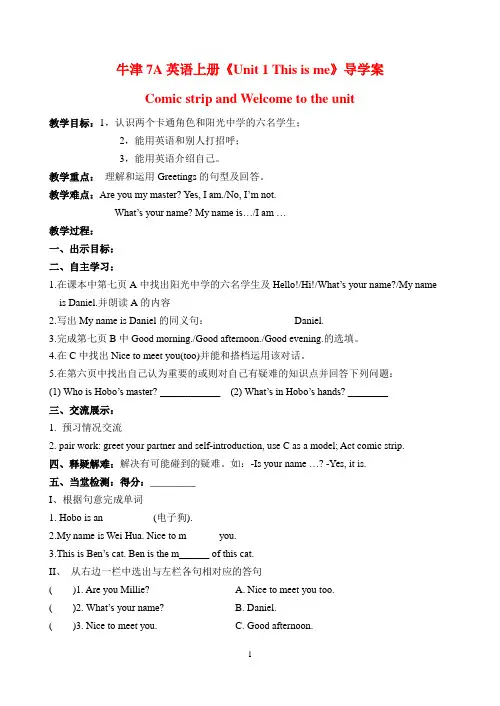
牛津7A英语上册《Unit 1 This is me》导学案Comic strip and Welcome to the unit教学目标:1,认识两个卡通角色和阳光中学的六名学生;2,能用英语和别人打招呼;3,能用英语介绍自己。
教学重点:理解和运用Greetings的句型及回答。
教学难点:Are you my master? Yes, I am./No, I’m not.What’s your name? My name is…/I am …教学过程:一、出示目标:二、自主学习:1.在课本中第七页A中找出阳光中学的六名学生及Hello!/Hi!/What’s your name?/My name is Daniel.并朗读A的内容2.写出My name is Daniel的同义句:_______ ________ Daniel.3.完成第七页B中Good morning./Good afternoon./Good evening.的选填。
4.在C中找出Nice to meet you(too)并能和搭档运用该对话。
5.在第六页中找出自己认为重要的或则对自己有疑难的知识点并回答下列问题:(1) Who is Hobo’s master? ____________ (2) What’s in Hobo’s hands? ________三、交流展示:1. 预习情况交流2. pair work: greet your partner and self-introduction, use C as a model; Act comic strip.四、释疑解难:解决有可能碰到的疑难。
如:-Is your name …? -Yes, it is.五、当堂检测:得分:_________I、根据句意完成单词1. Hobo is an _________ (电子狗).2.My name is Wei Hua. Nice to m______ you.3.This is Ben’s cat. Ben is the m______ of this cat.II、从右边一栏中选出与左栏各句相对应的答句( )1. Are you Millie? A. Nice to meet you too.( )2. What’s your name? B. Daniel.( )3. Nice to meet you. C. Good afternoon.( )4. How are you? D. Yes, I am( )5. Good afternoon. E. Fine, thanks.III、单项选择( )1. Eddie has ______ e-dog, and ______ e-dog is very good.A. an; anB. the; anC. a; theD. an; the ( )2. Nice to meet you. __________A. 肉B.遇到C. 会议D. 听见( )3. Please _________ my baby when I’m out, Mary.A. look afterB. look atC. look upD. look out ( )4. -What’s ______ name? – My name is Li Ping.A. hisB. youC. yourD. me ( )5. –What’s her name? -___________A. It’s SimonB. Her is MaryC. She’s MaryD. His name is Sandy( )6. I’m Jack Brown. Jack is my ______ name.A. EnglishB. familyC. firstD. last( )7. This _______ my friend Kitty.A. amB. isC. areD. be( )8. _______ are my grandparents and _______ is my father.A. This; thatB. That; thisC. These; thatD. This; those ( )9. Let’s _______ the new students over there.A. get to knowB. get upC. go homeD. get on ( )10. Do you ______ a book every morning?A. seeB. watchC. look atD. readIV、按要求写出下列单词或词组的相应形式1. two 的同音单词________________2. R的同音单词_______________3. I’m (完全形式)______________4. is not(缩略形式)______________V、句型转换1. He is Liu Hua. ( 同义句转换) ______ ________ is Liu Hua.2. Is your name Tina?(作出肯定回答) ______,______ ______.3.Are you Mr. Black?(作出否定回答) ______, _______ ______4.His name is Tony.(对划线部分提问) ______ ______ ______ name?5.She is Lily.(改为同义句) _________ _________ Lily.6.This is Kitty.(改为否定句) ______________________.7.This is Mrs. Black.(改为一般疑问句并做肯定回答)______ ______ Mrs. Black? ______,______ ______.VI、完形填空Hello, everyone. Nice _1_ you. We are in a new school this year. We can make new __2_ in our school. We ___3___ a new English teacher, too. __4___ is Miss Gao. She is about thirty __5___ old. She __6__ beautiful and is very __7__ to us students. We love her very much.We will also have __8__ special(特殊的) friends in our English books. __9__ are Eddieand Hobo. Eddie is a fat dog and it is lovely. But Hobo ______ a real dog. It is an electric(电子的) dog. Do you think it is lovely?( )1. A. meet B. meets C. to meet D. to watch ( )2. A. books B. friends C. clothes D. desks( )3. A. there is B. there are C. have D. has( )4. A. I B. You C He D. She( )5. A. weeks B. years C. hours D. days( )6. A. read B. reads C. look D. looks( )7. A. kind B. bad C. late D. tall( )8. A. one B. two C. three D. four( )9. A. We B. You C. They D. Their( )10.A. is B. isn’t C. am not D. aren’tVII、书面表达用英文写一段话介绍自己(不少于5句)____________________________________________________________________________________________________________________________________________________________________________________________________________________________________________________________________________________________________________________ 六、自我评价:七年级英语上册《Unit 1 This is me》导学案Reading(1)教学目标:1,进一步了解阳光中学的几名学生;2,学习描绘人的方式;3,用英语介绍自己或他人。
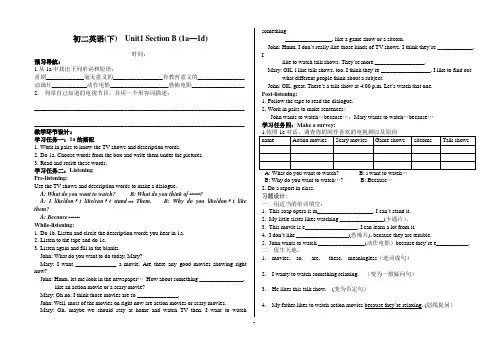
初二英语(下)Unit1 Section B (1a—1d)时间:预习导航:1.从1a中找出下列单词和短语:喜剧_____________毫无意义的_________________有教育意义的________________ 动画片____________动作电影____________________恐怖电影__________________ 2.列举自己知道的电视节目,并用一个形容词描述:________________________________________________________________________________________________________________________________________________ 教学环节设计:学习任务一:1a的搭配1.Work in pairs to know the TV shows and description words.2.Do 1a. Choose words from the box and write them under the pictures.3. Read and recite these words.学习任务二:ListeningPre-listening:Use the TV shows and description words to make a dialogue.A: What do you want to watch? B: What do you think of……?A: I like/don’t like/can’t stand…Them. B: Why do you like/don’t like them?A: Because……While-listening:1.Do 1b. Listen and circle the description words you hear in 1a.2.Listen to the tape and do 1c.3.Listen again and fill in the blanks.John: What do you want to do today, Mary?Mary: I want ______________ a movie. Are there any good movies showing right now?John: Hmm, let me look in the newspaper…How about something _______________, like an action movie or a scary movie?Mary: Oh no, I think those movies are so ______________.John: Well, most of the movies on right now are action movies or scary movies. Mary: Oh, maybe we should stay at home and watch TV then. I want to watch something________________, like a game show or a sitcom.John: Hmm. I don’t really like those kinds of TV shows. I think they’re ____________. Ilike to watch talk shows. They’re more _________________.Mary: OK, i like talk shows, too. I think they’re _________________. I like to find out what different people think about a subject.John: OK, great. There’s a talk show at 4:00 p.m. Let’s watch that one.Post-listening:1.Follow the tape to read the dialogue.2.Work in pairs to make sentences:John wants to watch…because…;Mary wants to watch…because…学习任务四:Make a survey:B: Why do you want to watch…? B: Because…2. Do a report in class.习题设计:一.用适当的单词填空:1. This soap opera is m___________________. I can’t stand it.2. My little sister likes watching _______________(卡通片)。
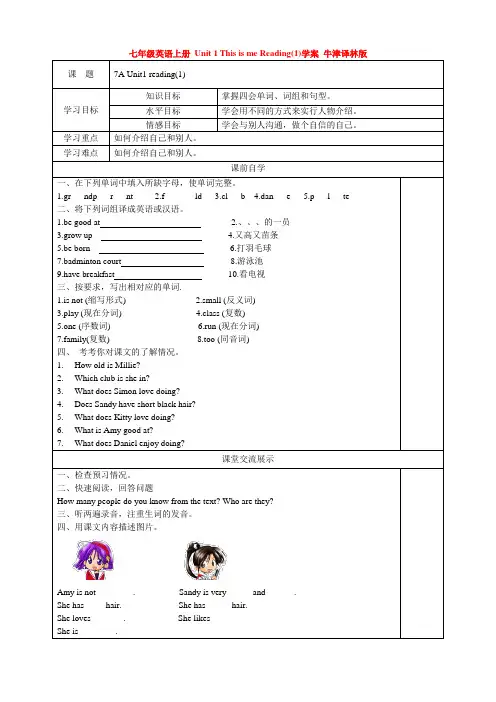
七年级英语上册Unit 1 This is me Reading(1)学案牛津译林版课题7A Unit1 reading(1)学习目标知识目标掌握四会单词、词组和句型。
水平目标学会用不同的方式来实行人物介绍。
情感目标学会与别人沟通,做个自信的自己。
学习重点如何介绍自己和别人。
学习难点如何介绍自己和别人。
课前自学一、在下列单词中填入所缺字母,使单词完整。
1.gr___ndp___r___nt2.f___ ___ ld3.cl___b4.dan___e5.p___l___te二、将下列词组译成英语或汉语。
1.be good at2.、、、的一员_________________3.grow up4.又高又苗条____________________5.be born6.打羽毛球______________________7.badminton court8.游泳池________________________9.have breakfast 10.看电视_______________________三、按要求,写出相对应的单词.1.is not (缩写形式)______________2.small (反义词)_____________3.play (现在分词)_______________4.class (复数) _______________5.one (序数词)_________________6.run (现在分词)_____________7.family(复数)_________________ 8.too (同音词)________________四、考考你对课文的了解情况。
1.How old is Millie? ____________________________________2.Which club is she in? ____________________________________3.What does Simon love doing? ____________________________________4.Does Sandy have short black hair? ____________________________________5.What does Kitty love doing? ____________________________________6.What is Amy good at? ____________________________________7.What does Daniel enjoy doing? ____________________________________课堂交流展示一、检查预习情况。
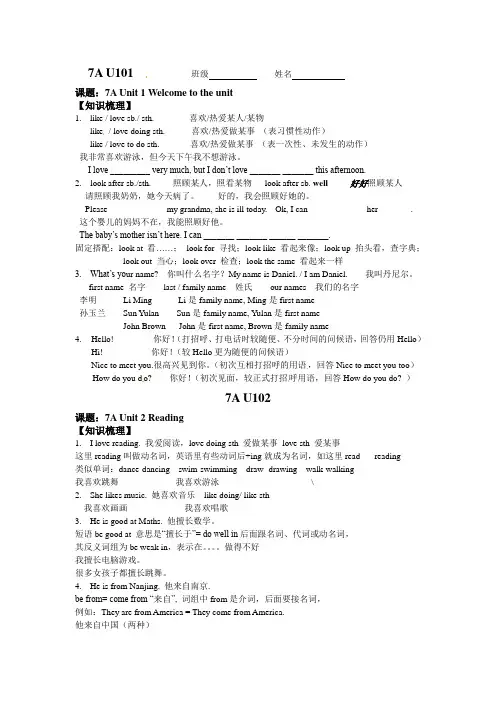
7A U101 班级姓名课题:7A Unit 1 Welcome to the unit【知识梳理】1.like / love sb./ sth. 喜欢/热爱某人/某物like/ love doing sth. 喜欢/热爱做某事(表习惯性动作)like / love to do sth. 喜欢/热爱做某事(表一次性、未发生的动作)我非常喜欢游泳,但今天下午我不想游泳。
I love _________ very much, but I don’t love _______ _______ this afternoon.2. look after sb./sth. 照顾某人,照看某物look after sb. well好好照顾某人--请照顾我奶奶,她今天病了。
--好的,我会照顾好她的。
--Please ______ ______ my grandma, she is ill today. --Ok, I can ______ ______ her _______. 这个婴儿的妈妈不在,我能照顾好他。
The baby’s mother isn’t here. I can _______ _______ ______ _______.固定搭配:look at 看……;look for 寻找;look like 看起来像;look up 抬头看,查字典;look out 当心;look over 检查;look the same 看起来一样3. What’s yo ur name? 你叫什么名字?My name is Daniel. / I am Daniel. 我叫丹尼尔。
first name 名字last / family name 姓氏our names 我们的名字李明Li Ming Li是family name, Ming是first name孙玉兰Sun Yulan Sun是family name, Yulan是first nameJohn Brown John是first name, Brown是family name4.Hello! 你好!(打招呼、打电话时较随便、不分时间的问候语,回答仍用Hello)Hi! 你好!(较Hello更为随便的问候语)Nice to meet you.很高兴见到你。
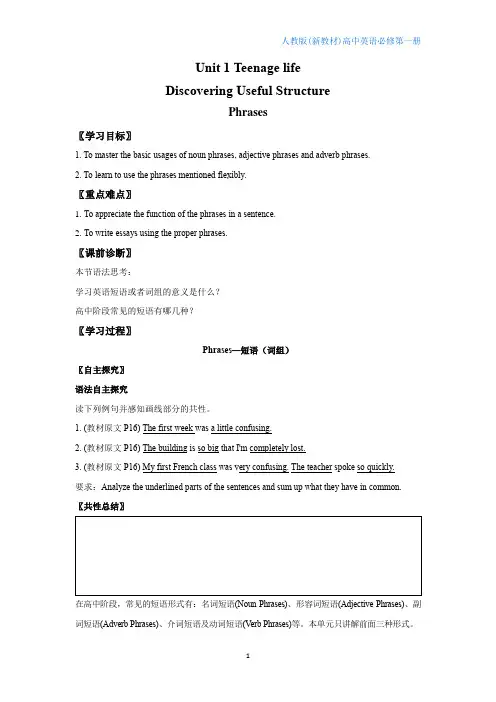
Unit 1 Teenage lifeDiscovering Useful StructurePhrases〖学习目标〗1. To master the basic usages of noun phrases, adjective phrases and adverb phrases.2. To learn to use the phrases mentioned flexibly.〖重点难点〗1.To appreciate the function of the phrases in a sentence.2.To write essays using the proper phrases.〖课前诊断〗本节语法思考:学习英语短语或者词组的意义是什么?高中阶段常见的短语有哪几种?〖学习过程〗Phrases—短语(词组)〖自主探究〗语法自主探究读下列例句并感知画线部分的共性。
1. (教材原文P16) The first week was a little confusing.2. (教材原文P16) The building is so big that I'm completely lost.3. (教材原文P16) My first French class was very confusing. The teacher spoke so quickly.要求:Analyze the underlined parts of the sentences and sum up what they have in common.〖共性总结〗在高中阶段,常见的短语形式有:名词短语(Noun Phrases)、形容词短语(Adjective Phrases)、副词短语(Adverb Phrases)、介词短语及动词短语(V erb Phrases)等。
本单元只讲解前面三种形式。
一、名词短语(Noun Phrases)名词短语:指以一个名词为中心构成的短语,在句中的功能相当于名词,可作主语、宾语、表语或宾语补足语。
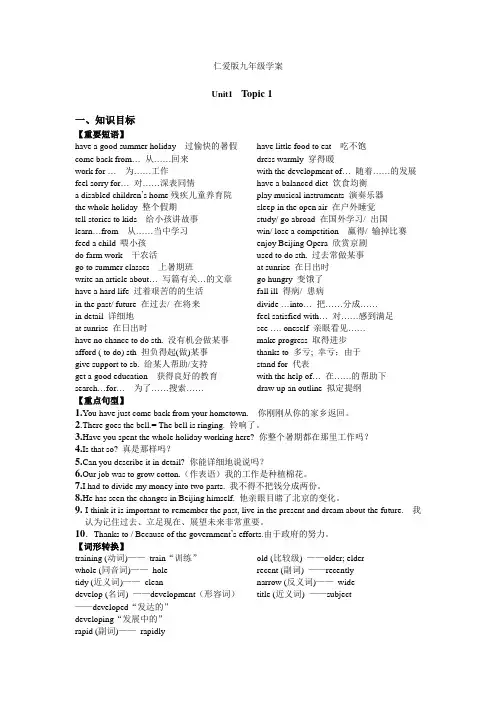
仁爱版九年级学案Unit1 Topic 1一、知识目标【重要短语】have a good summer holiday 过愉快的暑假come back from…从……回来work for …为……工作feel sorry for…对……深表同情a disabled children’s home残疾儿童养育院the whole holiday 整个假期tell stories to kids 给小孩讲故事learn…from 从……当中学习feed a child 喂小孩do farm work 干农活go to summer classes 上暑期班write an article about…写篇有关…的文章have a hard life 过着艰苦的的生活in the past/ future 在过去/ 在将来in detail 详细地at sunrise 在日出时have no chance to do sth. 没有机会做某事afford ( to do) sth 担负得起(做)某事give support to sb. 给某人帮助/支持get a good education 获得良好的教育search…for…为了……搜索……have little food to eat 吃不饱dress warmly 穿得暖with the development of…随着……的发展have a balanced diet 饮食均衡play musical instruments 演奏乐器sleep in the open air 在户外睡觉study/ go abroad 在国外学习/ 出国win/ lose a competition 赢得/ 输掉比赛enjoy Beijing Opera 欣赏京剧used to do sth. 过去常做某事at sunrise 在日出时go hungry 变饿了fall ill 得病/ 患病divide …into…把……分成……feel satisfied with…对……感到满足see …. oneself 亲眼看见……make progress 取得进步thanks to 多亏; 幸亏;由于stand for 代表with the help of…在……的帮助下draw up an outline 拟定提纲【重点句型】1.You have just come back from your hometown. 你刚刚从你的家乡返回。
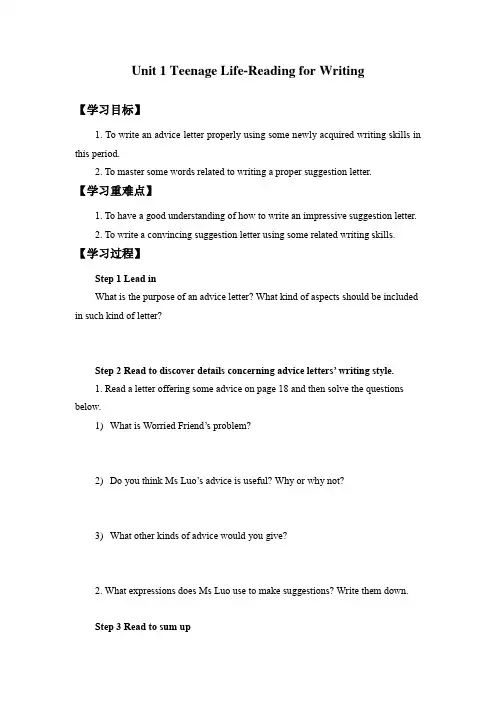
Unit 1 Teenage Life-Reading for Writing【学习目标】1. To write an advice letter properly using some newly acquired writing skills in this period.2. To master some words related to writing a proper suggestion letter.【学习重难点】1. To have a good understanding of how to write an impressive suggestion letter.2. To write a convincing suggestion letter using some related writing skills.【学习过程】Step 1 Lead inWhat is the purpose of an advice letter? What kind of aspects should be included in such kind of letter?Step 2 Read to discover details concerning advice letters’ writing style.1. Read a letter offering some advice on page 18 and then solve the questions below.1)What is Worried Friend’s problem?2)Do you think Ms Luo’s advice is useful? Why or why not?3)What other kinds of advice would you give?2. What expressions does Ms Luo use to make suggestions? Write them down.Step 3 Read to sum upRead the passage on Page 18 again and figure out the organization of the letter.Write down the sentences from the passage that match the following points.A. I know what the problem is.B. I understand how you feel.C. This is my advice and reasonsD. I think my advice will help.Step 4 Use what you have learnt to write a letter of advice to one of the teenager below.Choose one of the teenagers and discuss his or her problems. List possible suggestions and reasons.Eric 15, ChicagoMin Ho, 15, SeoulStep 5 Use what you have learnt to draft a letter offering advice to any ofthose students above.Your version:_________________________________________________________________ _________________________________________________________________ _________________________________________________________________ _________________________________________________________________ _________________________________________________________________ Step 6 Discuss with your partners and figure out the following aspects.建议信的模板_________________________________________________________________ _________________________________________________________________ _________________________________________________________________ _________________________________________________________________ _________________________________________________________________ _________________________________________________________________建议信常见句式_________________________________________________________________ _________________________________________________________________ _________________________________________________________________ _________________________________________________________________活动目的:教育学生懂得“水”这一宝贵资源对于我们来说是极为珍贵的,每个人都要保护它,做到节约每一滴水,造福子孙万代。
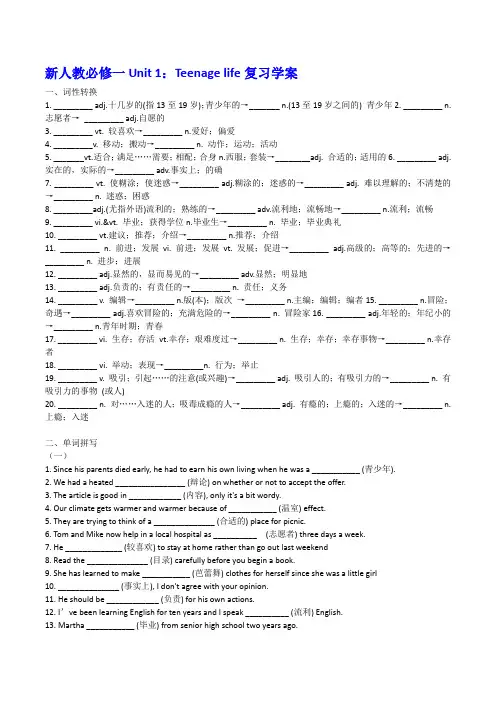
新人教必修一Unit 1:Teenage life复习学案一、词性转换1. _________ adj.十几岁的(指13至19岁);青少年的→_______ n.(13至19岁之间的) 青少年2. _________ n. 志愿者→_________ adj.自愿的3. _________ vt. 较喜欢→_________ n.爱好;偏爱4. _________v. 移动;搬动→_________ n. 动作;运动;活动5. _______vt.适合;满足……需要;相配;合身n.西服;套装→________adj. 合适的;适用的6. _________ adj.实在的,实际的→_________ adv.事实上;的确7. _________ vt. 使糊涂;使迷惑→_________ adj.糊涂的;迷惑的→_________ adj. 难以理解的;不清楚的→_________ n. 迷惑;困惑8. _________adj.(尤指外语)流利的;熟练的→_________ adv.流利地;流畅地→_________ n.流利;流畅9. _________ vi.&vt. 毕业;获得学位n.毕业生→_________ n. 毕业;毕业典礼10. _________ vt.建议;推荐;介绍→_________ n.推荐;介绍11. _________ n. 前进;发展vi. 前进;发展vt. 发展;促进→_________ adj.高级的;高等的;先进的→_________ n. 进步;进展12. _________ adj.显然的,显而易见的→_________ adv.显然;明显地13. _________ adj.负责的;有责任的→_________ n. 责任;义务14. _________ v. 编辑→_________ n.版(本);版次→_________ n.主编;编辑;编者15. _________ n.冒险;奇遇→_________ adj.喜欢冒险的;充满危险的→_________ n. 冒险家16. _________ adj.年轻的;年纪小的→_________ n.青年时期;青春17. _________ vi. 生存;存活vt.幸存;艰难度过→_________ n. 生存;幸存;幸存事物→_________ n.幸存者18. _________ vi. 举动;表现→_________n. 行为;举止19. _________ v. 吸引;引起……的注意(或兴趣)→_________ adj. 吸引人的;有吸引力的→_________ n. 有吸引力的事物(或人)20. _________ n. 对……入迷的人;吸毒成瘾的人→_________ adj. 有瘾的;上瘾的;入迷的→_________ n. 上瘾;入迷二、单词拼写(一)1. Since his parents died early, he had to earn his own living when he was a ___________ (青少年).2. We had a heated ________________ (辩论) on whether or not to accept the offer.3. The article is good in ____________ (内容), only it's a bit wordy.4. Our climate gets warmer and warmer because of ___________ (温室) effect.5. They are trying to think of a ______________ (合适的) place for picnic.6. Tom and Mike now help in a local hospital as __________ (志愿者) three days a week.7. He _____________ (较喜欢) to stay at home rather than go out last weekend8. Read the ______________ (目录) carefully before you begin a book.9. She has learned to make ___________ (芭蕾舞) clothes for herself since she was a little girl10. ______________ (事实上), I don't agree with your opinion.11. He should be ____________ (负责) for his own actions.12. I’ve been learning English for ten years and I speak __________ (流利) English.13. Martha ___________ (毕业) from senior high school two years ago.14. She signed up for ____________ (高等) maths last term.15. There is no simple ____________ (解决办法) to this problem.16. He has read many of the major works of ____________ (文学).17. I asked for an ___________ (额外的)day to finish the work because it can't be finished in a day18. It's not easy to _____________ (停止,戒掉) smoking cigarettes.19. The first part of the project was completed two months ahead of _________ (工作计划).20. All copy must be printed and sent to the ____________ (编辑) by Friday morning.21. I'm totally ______________ (糊涂的). Could you explain that again?22. I have been _____________ (建议) to go to a big city to find a better job.23. The students began to discuss the ____________ (话题) of travelling.24. _____________ (显而易见),the students should get well prepared for25.I like to __________ (挑战)myself。
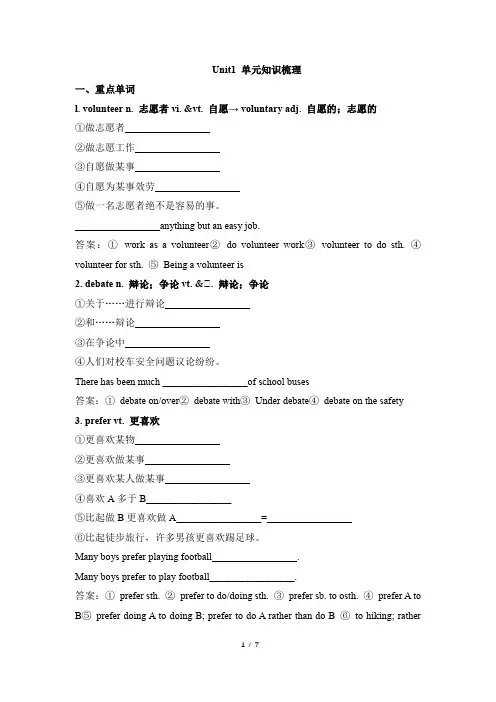
Unit1 单元知识梳理一、重点单词l. volunteer n. 志愿者vi. &vt. 自愿→ voluntary adj. 自愿的;志愿的①做志愿者_________________②做志愿工作_________________③自愿做某事_________________④自愿为某事效劳_________________⑤做一名志愿者绝不是容易的事。
_________________anything but an easy job.答案:①work as a volunteer②do volunteer work③volunteer to do sth. ④volunteer for sth. ⑤Being a volunteer is2. debate n. 辩论;争论vt. &ⅵ. 辩论;争论①关于……进行辩论_________________②和……辩论_________________③在争论中_________________④人们对校车安全问题议论纷纷。
There has been much _________________of school buses答案:①debate on/over②debate with③Under debate④debate on the safety3. prefer vt. 更喜欢①更喜欢某物_________________②更喜欢做某事_________________③更喜欢某人做某事_________________④喜欢A多于B_________________⑤比起做B更喜欢做A_________________=_________________⑥比起徒步旅行,许多男孩更喜欢踢足球。
Many boys prefer playing football_________________.Many boys prefer to play football_________________.答案:①prefer sth. ②prefer to do/doing sth. ③prefer sb. to osth. ④prefer A to B⑤prefer doing A to doing B; prefer to do A rather than do B ⑥to hiking; ratherthan hike4. content n. 内容;[pl. ]目录;(书、讲话、节目等的)主题;满足adj. 小满足的;满意的vt. 使满足①在内容和形式上_________________②满足的表情_________________③对……感到满足/满意_________________④愿意做某事_________________⑤尽情地;心满意足地_________________⑥使某人/自己对……满意_________________答案:①in content and form ② a content expression③feel/be content with④be content to do sth. ⑤to one’s heart’s content ⑥content sb /oneself with sth.5. suitable adj. 合适的;适用的①对……适合的_________________②适合做某事_________________③这些鞋不适合在乡下散步。
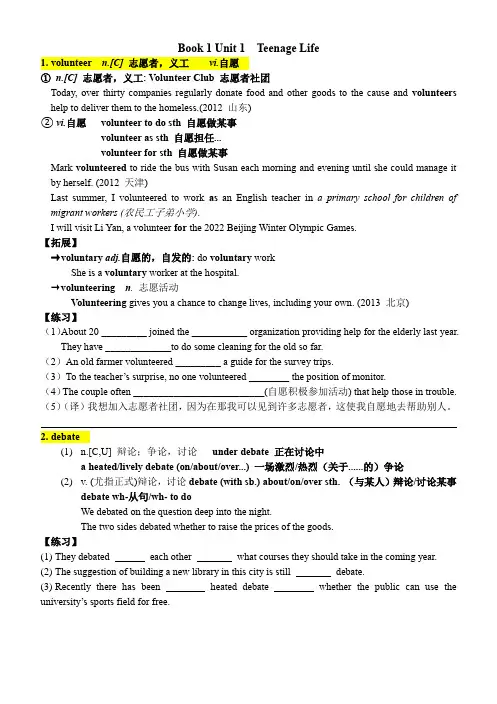
Book 1 Unit 1 Teenage Life1.volunteer n.[C]志愿者,义工vi.自愿①n.[C]志愿者,义工: Volunteer Club 志愿者社团Today, over thirty companies regularly donate food and other goods to the cause and volunteers help to deliver them to the homeless.(2012 山东)② vi.自愿volunteer to do sth 自愿做某事volunteer as sth 自愿担任...volunteer for sth 自愿做某事Mark volunteered to ride the bus with Susan each morning and evening until she could manage it by herself. (2012 天津)Last summer, I volunteered to work as an English teacher in a primary school for children of migrant workers (农民工子弟小学).I will visit Li Yan, a volunteer for the 2022 Beijing Winter Olympic Games.【拓展】→voluntary adj.自愿的,自发的: do voluntary workShe is a voluntary worker at the hospital.→volunteering n. 志愿活动Volunteering gives you a chance to change lives, including your own. (2013 北京)【练习】(1)About 20 _________ joined the ___________ organization providing help for the elderly last year.They have _____________to do some cleaning for the old so far.(2)An old farmer volunteered _________ a guide for the survey trips.(3)To the teacher’s surprise, no one volunteered ________ the position of monitor.(4)The couple often __________________________(自愿积极参加活动) that help those in trouble.(5)(译)我想加入志愿者社团,因为在那我可以见到许多志愿者,这使我自愿地去帮助别人。
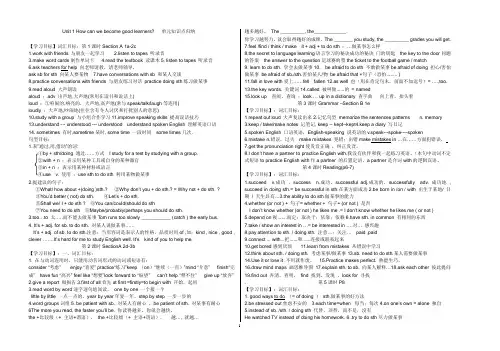
Unit 1 How can we become good learners? 单元知识点归纳【学习目标】词汇目标:第1课时Section A 1a-2c1.work with friends 与朋友一起学习2.listen to tapes 听录音3.make word cards制作单词卡4.read the textbook 读课本5. listen to tapes 听录音6.ask teachers for help 向老师请教,请老师辅导,ask sb for sth 向某人要某物7.have conversations with sb 和某人交谈8.practice conversations with friends 与朋友练习对话practice doing sth练习做某事9.read aloud 大声朗读aloud :adv 出声地,大声地(常用在读书和说话上)loud :①喧闹的,响亮的,大声地,高声地(常与speak/talk/laugh等连用)loudly :大声地,吵闹地(往往含有令人讨厌和打扰别人的意思)10.study with a group 与小组合作学习11.improve speaking skills 提高说话技巧13.understand --- understood --- understood understand spoken English 理解英语口语14. sometimes 有时,sometime某时, some time 一段时间some times几次.句型目标:1.表”通过,用,借助”的词:①by + sth/doing 通过……方式I study for a test by studying with a group.②with + n :表示用某种工具或自身的某种器官③in + n :表示用某种材料或语言④use v. 使用:use sth to do sth 利用某物做某事2.提建议的句子:①What/ how about +(doing )sth.? ②Why don’t you + do sth.? = Why not + do sth. ?③You’d better ( not) do sth. ④Let’s + do sth.⑤Shall we/ I + do sth.? ⑥You can/could/should do sth⑦You need to do sth ⑧Maybe/probably/perhaps you should do sth.3.too…to 太…..而不能去做某事Tom runs too slowly ___________ (catch ) the early bus.4. It’s + adj. for sb. to do sth. 对某人说做某事……It’s + adj. of sb. to do sth.注意:当形容词是表示人的性格,品质时用of ,如:kind , nice , good , clever …….It’s hard for me to study English well.It’s kind of you to help me.第2课时SectionA 2d-3b【学习目标】:一、词汇目标:1. 在与动词连用时,只能用动名词形式的动词或短语有:consider “考虑” enjoy “喜爱” practice“练习”k eep (on)“继续(一直)”mind “介意” finish“完成” have fun “高兴” feel like “想要”look forward to “盼望” can’t help “禁不住” give up “放弃”2.give a report 做报告3.first of all首先at first =firstly=to begin with 开始,起初3.read word by word逐字逐句地阅读,one by one 一个接一个little by little 一点一点的,year by year年复一年,step by step 一步一步的4.word groups词组5. be patient with sb. 对某人有耐心,be patient of sth. 对某事有耐心6The more you read, the faster you’ll be. 你读得越多,你就会越快。
Module 1 Unit 1Whose bag is this?【学习目标】1.能够正确使用名词性物主代词询问或表示物体的所属关系;能够读懂有关失物招领的文章,理解语篇主题和细节;能写简单的失物招领启事。
2.通过听力训练、对话练习、写作练习等方式展开自主学习。
3.培养乐于助人、拾金不昧、礼貌待人的优良品质。
◎课时重点:1.能运用whose引导的句型讨论和询问物体的所属关系。
2.初步理解名词性物主代词的运用。
【预习导学】一、填一填1.失物招领箱_______2.从现在起_______3.首先_______4.来看看_______5.许多_______6.注意;小心_______二、译一译1.各位,欢迎返校!_______2.这足球是Tony的吗?_______3.这是紫色钱包!_______4.这些是谁的手套?_______三、想一想1.形容词性物主代词有哪些?_______2.名词性物主代词有哪些?_______3.whose的用法是怎样的?_______【答案】预习导学一、1.lost and found box2.from now on3.first of all4 e and look5.a lot of/lots of6.be careful with二、1.Wele back to school, everyone!2.Is the football Tony's?3.Here's a purple wallet!4.Whose gloves are these?三、1.my, your, his, her, its, our, their2.mine, yours, his, hers, its, ours, theirs3.对物主代词或名词所有格提问用whose。
【合作探究】任务驱动一听力练习1.听课本第3部分的录音,按照你所听到的内容的先后顺序,给下面方框中的单词标出序号。
Unit 1 People of Achievement Period 1 Reading and Thinking 教学设计课题Period 1 TU YOU YOUAW ARDED NOBEL PRIZE 单元Unit 1 学科English 年级Senior1Class 3教材分析Reading and thinking is a news report.The passage mainly tells about “Tu Youyou Awarded Nobel Prize”,asks students to learn the Artemisinin research process,analyze and refine Tu Youyou’s excellent quality.教学目标与核心素养1.Knowledge objectives:To prediction of the content;To make the structure of the passage; To fully understand the whole article.2.Skill objectives: To get the main idea,paragraph meaning and some details by careful reading.3. Emotional objectives:To sum up and refine the greatness of Tu Youyou and the team;4. Thinking quality objectives: To describe the character of Tu you in the form of recommendation letter according to the content and feeling of the text;重点Summarizing and refining the greatness of Tu Youyou and the team.难点1.What kind of person makes great discoveries?2.What qualities do the research team possess according to the data?教学过程教学环节教师活动学生活动设计意图Step1. Lead in 1.describing some people tostudents,guess who they are accordingto the description;2.Give a picture of sweet warm woodand ask students to guess whodiscovered the artemisinin ;Students can guessthe people accordingto the description.To arousestudents’ interestand lead in thetopic;Step6: Homework 1. Memorize new words.2. Preview Language Points.。
Unit 1 Period 1一、词组翻译1.青少年杂志2. 再吃些食物3. 一个诚实的男孩4.保密5. 使我快乐6. 相信他的话7.有困难8. 分享我的快乐二、用所给词的适当形式填空。
1. Lucy is always willing ____________________(share) things and help others.2. Max _______________(not do) any computer work after school yesterday.3. --Is Jack good at ____________(tell) jokes? --No, he isn’t.4. The man put on his hat and ____________(go) away.5. --What about ____________(drink) some tea?三、翻译下列句子。
1. ------你想来点喝的吗?------不,谢谢?2. 冰箱里没有什么东西了,你能帮我买些吗??3. 或许你能和我合用一个房间。
.4. 如果你学习英语有问题,我能帮你。
.5. 你认为什么使得你的朋友如此特别??四、综合训练Mr. Jones was very a_1__ with his wife and his wife was very angry with her husband. For a f__2__ days, they didn’t s__3_ to each other. One evening, Mr. Jones was very t__4_ when he came back from work, so he went to bed s_5_ after he went upstairs. Mrs. Jones washed the s__6__ things and did some sewing. When she went up to bed much l__7_ than her husband, she found a piece of paper on the small table near her bed. On it w__8_ the words, “Mother, wake me up at 7 a.m.—Father.” The next day, when Mr. Jones s__9_ woke up, he found it was 8 a.m. Also, he saw a big piece of paper on the table. It s__10_, “ Father, wake up. It is 7 a.m. –Mother.”1.a_________2.f__________3.s___________4.t___________5.s___________6.s_________7.l__________8.w__________9.s___________10.s_________Unit 1 Period 2一、词组翻译1.我最好的朋友之一______________________ 2.给有需要的人让座___________________3.和某人分享某物_______________________ 4.很有幽默感_________________________5.讲滑稽的笑话_________________________6.说别人的坏话_________________________7. 保密__________________________ 8.让我大笑_____________________________二、词汇运用1. Betty is (help). She’s always ready (help) people any time.2. He has a good sense of humour. I never feel (bore) or (happy)when I’m with him.3. The small round (glass) make him (look) smart.4. Are you (will) (sing) us an English song?5.------Can you give me something ______(drink) ? -----Yes, of course.6. When something (worry) me, I can always go to her.三、单项选择1.Many students are willing_______ hard to make their dreams come true .A, work B. to work C. working D. worked2.------Did you see the movie So Young last week?------Yes ,but I think it’s ______.I feel asleep when I saw it.A .exciting B. boring C. bored D. excited3.Kitty was careless .She ____the cup _____the ground.A. knocked; offB. knocked ;atC. knocked ;over D .knocked ;onto4.Mount Huang is more beautiful than____ in ChinaA. any other mountainB. any other mountainsC. other mountainsD. any mountains5.Funny jokes can always make us________ when we are sad.A. laughingB. laughC. laughedD. laughs四、综合训练To Lose Some WeightA young man was sitting by the road and eating something. A policeman was coming over to him. The man got up quickly and ran down the road when he saw the policeman . The policeman ran after him right away. The man ran fast, but the policeman ran much faster than him. After a few minutes, the policeman caught him. “Where are you going, young man?” the policeman asked him. “You must be a criminals(罪犯) if you run like that when you see a policeman.” “No, no,”said the man quickly, “I am not a criminal. I am just too fat. You see, the doctor tells me that I must run fast after eating something.” “I see”, said t he policeman, “You are running to help to lose some weight(减肥)”.( )1. A young man was sitting by the road and something.A. lookingB. seeingC. eatingD. drinking( )2. Just at that time, a was coming.A. busB. manC. friendD. policeman( )3. What did the young man do when he saw the policeman?A. He said “Hello” to him.C. He was waiting for him. B. He got up and ran away.D. He cried at once.( )4. The policeman ran after the young man because .A. he was catching a busC. he thought he was a bad man B. he knew himD. the young man was a criminal( )5. Why did the young man run? Because .A. he saw his friend C. he saw a policemanB. he wanted to catch a busD. the doctor told him to run after eatingUnit 1 Period 3一、词组翻译1.愿意做某事 2时刻准备帮助别人3.与某人分享某物4.一个忠实的朋友5.需要帮助的人6.把某物撞翻到地上7.使我大笑 8. 很有幽默感二、词汇运用1. Kate wants to be a (sing) when she (grow) up.2. He has a good sense of humour. I never feel (bore) or (happy) when I’m with him.3. She has a (wonder) friend (name) Kitty.4. Are you (will) (sing) us an English song?5. When something (worry) me, I can always go to her.三、翻译句子1. 她穿那条粉色的裙子非常合适。
9上Unit 1 Comic Strip&Welcome to the unit 学习目标:1. 学会用适当的语言描述人的性格特点。
2. 学会简单谈论自己和他人的性格特点及喜欢和不喜欢的职业。
学习重难点:掌握本课时出现的重点语言点。
学习过程:一、课前预习A.翻译1. 有创造力的 ____________________2. 好奇的____________________3. 精力充沛的____________________4. 谦虚的____________________5. 有条理的;有效率的____________________6. 顺序____________________7. 使…保持井然有序_______________________________________8. 炫耀____________________ 9. 语法____________________10. 想出(主意)__________________________________________11. (否定句中)两者之一不____________________________________________12. 也不____________________ 13. 既不…也不…____________________14. 会计____________________B.完成书本P7 A部分的内容二、自主学习A. 阅读P7 A部分内容,翻译下列句子。
①Suzy使她所有的物品保持井然有序。
____________________________________________________________________②他经常想出新主意。
_____________________________________________________________________B. 阅读P7 B部分对话,回答问题1) Can Paul make a good account? Why or why not?____________________________________________________________________ 2) What does Sandy’s art teacher say about Sandy?_____________________________________________________________________三、合作探究A. Listen to the comic strip and answer the following questions.⑴What is the interesting article about? ______________________________⑵What happens to Eddie’s breakfast in the end? ______________________________⑶Is Eddie willing to share his breakfast with Hobo?___________________________B. Read and translate the comic strip四、达标反馈单项选择( ) 1. ---Don’t worry. I will help you.---Thank you. It’s very kind _______ you to say so.A. forB. onC. toD. of( ) 2. Can you keep winning matches without _________ even one point?A. losingB. missingC. lossD. lost( ) 3. Neither Tom nor I _________ tall.A. areB. isC. amD. be五、作业布置9上Unit 1 Reading(I)学习目标:1认识四位在各自工作领域表现杰出的人物。
B1U1 第一课时学案(Listening and Speaking)学习目标(一)拼读本单元重点单词(二)通过有关俱乐部和俱乐部活动的自然对话练习预测和聆听(三)学会使用从对话中学到的表达方式组织一个英文对话,主题是如何选择一个合适的俱乐部教学过程(一)复习内容1.回顾朗读以下单词grade cake escape map brand these jeep Chinese met bed forget write sight quiz listen hope alone frog coffee use future up discuss2.写出下列例句的句子结构(1)The weather is being warmer.________________________(2)She never lies._____________________(3)He has accepted our invitation.________________________(4)I find him a reliable man.___________________________(5)Will you show me your ticket, please?_________________________(二)新授课导入内容思考以下问题1.Can you name some clubs in your school?2.What do you do in these clubs?Warming upChoose a school club1.Match the photos with the names of the clubs. What do you think students do in theseclubs?Ballet Club ______ Nature Club ______ V olunteer Club ______ Debate Club ______ (三)教学内容1.Predict contentBefore you listen, you can read the questions and the choices. It will help you to predict what you will hear.【练习1】Listen to the first two conversations and choose the correct answers.(1)What are they learning about Conversation 1?A.HearingB. SoundsC. Dogs(2)The students are discussing ______ in Conversation 2.A.SchoolworkB. relationshipsC. dating(3)Circle the two clubs where these two conversations happened.A.Science ClubB. Ballet ClubB.Nature Club D. Debate Club【练习2】Listen to Conversation 3. Then help Adam choose a club.(1)Tick the activities that happen in each club.(2)Adam says that he likes ___________ but is not so interested in ____________.A. stories, cartoonsB. animals, plantsC. making friends, cleaning up(3)Which club do you think is suitable for Adam? Why?I think Adam should join the _____________Club because he says that he___________.nguage learningListen again and plete the conversation.(通过完成对话填写,总结如何用英语描述“喜欢”或者“不喜欢”)Julie: Hi, Adam! Are you going to join a club?Adam: Hi, Julie! ______________, but I’m not sure which one.Julie: I think I will join the Ballet Club._______________________________ to be a dancer, and ballet had such beautiful movements.A dam: Oh, wow, _________________________I’ve got two left feet! Mr Brown told meabout the Nature Club. They watch biology lectures and grow plants in a greenhouse. I like animals, ________________.Julie: Did you hear about the Cartoon Club?Adam: Yes, __________________! But what do they do in the club? Watch cartoons?Julie: No, they write stories and draw cartoons.Adam: Oh, no. ________________. Besides, ________________.Julie: Max is in the V olunteer Club. He says that they mostly help clean up parks and give directions to visitors. ________________?...Like Dislike SuggestionI like/love/enjoy/prefer…I’m interested in…I’m into…I’m fond of…I’m crazy about…I’d like to…I don’t like…I hate…I have mixed feelings about…I’m not interested in…I’m not good at…I think you should …W hy not…?Y ou can try…Maybe you could…【单词讲解】prefer vt. 较喜欢preferredpreferredpreferringprefer doing sth / prefer to do sth 较喜欢做某事prefer (doing) sth to (doing) sth 比起(做)某物/事更喜欢(做)某物/事prefer to do rather than do sth 宁愿做某事也不愿做某事preference n. 偏爱;喜爱;优待have a preference for…偏爱…例句:I prefer playing in defence.I prefer jazz to rock music.They prefer to put off the birthday party till next Sunday rather than hold it without the preference of their manager.例句【练习Speaking】利用以上句型进行对话练习,关于我们如何选择一个合适的社团。
Unit 1 This is me!Comic strip & Welcome to the unit 自主预习:一、根据所给汉语提示选择正确的答语。
( ) 1. 当你想要告诉对方你的名字时,你说:__________A. Hi, good morning.B. Hi, I’m …C. I’m your master.( ) 2. 当你想要告诉对方你喜欢这个电子狗时,你说:__________A. My name is e-dog.B. I love this e-dog.C. Please read the book.( ) 3. 当你在晚上7:00见到你的朋友时,你说:__________A. Good evening.B. Good afternoon.C. Good night.( ) 4. 老师早晨来上课,对同学们说:__________A. How do you do, boys and girls?B. Good morning, boys and girls!C. Excuse me, are you Wang Lin?( ) 5. 好朋友常见面时,问候语一般是:__________A. Hi, my name is …B. How do you do?C. How are you?二、翻译下列词组和句子。
1. 喜爱电子狗________________________2. 照顾我________________________3. 交新朋友__________________________4. 我叫基蒂。
____________________5. 你是我的主人吗?__________________6. 晚安!________________________7. 第一节英语课______________________ 8. 怎样照顾电子狗________________初一英语第1 页共23 页达标检测:一、从Ⅱ栏中找出与Ⅰ栏句子相对应的选项。
ⅠⅡ( ) 1. Good night, Millie. A. Good evening.( ) 2. Hi, I’m Sandy. B. Good night, Daniel.( ) 3. What’s your name? C. I’m Simon.( ) 4. Good evening. D. Hi, I’m Amy.二、根据所给提示写单词。
1. The girl l__________ her mother very much.2. R__________ this book now, please!3. The boy is the cat’s __________ (主人).4. Good m__________, Mrs Wang!5. I don’t know how to look a__________ my dog.A. like stickersB. like drawingC. don’t like drawingReading (Ⅰ)自主预习:一、根据课文内容回答下列问题。
1. Does Millie love reading? ____________________2. Where does Simon live now? ____________________3. How old is Kitty? ____________________4. Does Kitty work hard? ____________________5. What’s Sandy like? ____________________初一英语第2 页共23 页6. Does Amy love swimming? ____________________7. Does Daniel like playing computer games? ____________________8. Does Amy have long hair? ____________________9. Do Kitty, Amy and Daniel study at Beijing Sunshine Secondary School? _____________二、根据课文内容填入适当的词。
1. Simon loves __________________.2. Daniel wears __________________.3. Amy has ______________ hair.4. Kitty works ___________________.5. Sandy likes __________________.6. Millie is in Class _______________.达标检测:根据课文内容填空。
Millie is 12 years old. She __________ in Beijing.Simon was born in Shanghai. But he __________ in Beijing now. He __________ playing football after school. He __________ one cousin. He name is Annie.Sandy is very __________ and slim. She __________ black hair. She __________ listening to music. Kitty, Amy and Daniel __________ her classmates.Kitty is 11 ________ old. She ________ small. She likes ________. She ________ hard.Amy is not very ________. She has short hair. She is good at ________. She is ________.Daniel _________ glasses. He is _________ and _________.Reading (Ⅱ)自主预习:一、选择填空。
( ) 1. __________ name is Jim.初一英语第3 页共23 页A. He’sB. HisC. He isD. Him( ) 2. __________ you good at singing?A. DoB. DoesC. AreD. Is( ) 3. I __________ born in Nanjing.A. beB. amC. isD. was( ) 4. He likes __________ music.A. listenB. listeningC. listen toD. listening to( ) 5. He always __________ to school by bike.A. goB. goesC. goingD. to go( ) 6. Sam __________ his homework at school.A. do doesB. doesn’t doC. does doD. do( ) 7. __________ your parents __________ Beijing?A. Are, liveB. Do, live inC. Are, live inD. Do, live二、翻译下列词组。
1. 住在上海_________________________2. 12岁_____________________________3. 在……方面很擅长_________________4. 戴眼镜___________________________5. 在排球队_________________________6. 喜爱阅读_________________________7. 出生在阜宁_______________________ 8. 玩电脑游戏_______________________9. 努力学习/工作_____________________ 10. 踢足球__________________________11. 欢迎来到我校_____________________ 12. 来自___________________________ 达标检测:一、根据首字母及句意填空。
1. He is very t__________ but his sister is short.初一英语第4 页共23 页2. He l__________ in Beijing now. But he was b__________ in Shanghai.3. Are you g__________ at English?4. The boy likes p__________ football very much.5. The girl is h__________ to old people. They all like her.二、用所给词的适当形式填空。
1. My __________ (England) name is Millie.2. He is __________ (help).3. She doesn’t wear __________ (glass).4. She loves __________ (swim).5. A: __________ she __________ (like) watching TV?B: No, she __________.6. He __________ (not love) __________ (read).7. There __________ (be) three children in this family.8. Millie is 13 __________ (year) old. She __________ (enjoy) __________ (dance).三、找出各句中的错误并改正。
( ) 1. Does he looks like his father? __________A B C D( ) 2. He watchs TV every evening. __________A B C D( ) 3. She hasn’t have lunch at home. __________A B C D( ) 4. Does he helpful? __________A B C初一英语第5 页共23 页四、根据所给汉语完成句子。